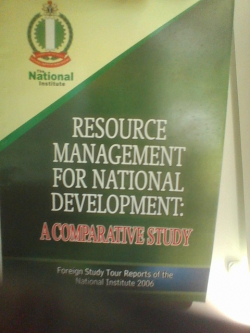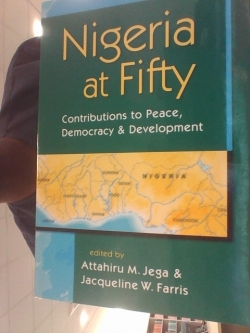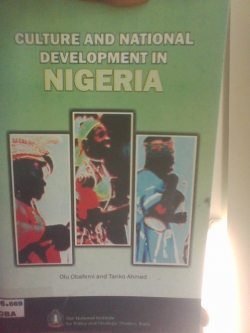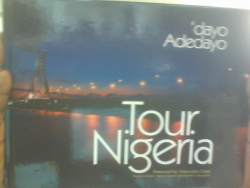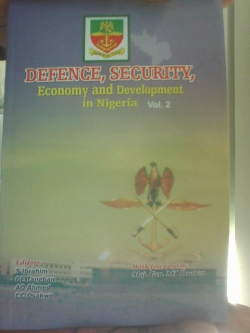Traditional Rulers and Development in Nigeria

Buy online ($)
Type
Book
Authors
PETERSIDE ( Soliri Joab, Alfred Chiakor )
ISBN 10
9783737406
Category
Publication Year
2014
Publisher
South-South Monarchs Forum , Nigeria
Pages
199
Subject
Traditional Rulers - Nigeria
Abstract
Although imperial capitalist incursion militarily subjugated pre-colonial societies, it did not destroy their traditional political governance institutions. Rather, these indigenous governance institutions were adopted by the colonial state to hold its exploitative mission under the policy of “Indirect Rule”. Little wonder traditional rulers played active role in colonial administration. Granted that the traditional governance institutions lost much of power attributed to them by the colonial state, they remain appropriate institutions of community representation in contemporary Nigeria. In fact, traditional rulers are important stakeholders in community development engineering but their role is fraught with ambiguity due to absence of any constitutional role assigned traditional governance institutions in the 1979, 1993 and 1999 constitutions.
There is no doubt that there are certain features of traditional political institutions that are incompatible with democratic governance. In spite of their imperfections, the traditional political institutions are much closer to the people at the grassroots and have profound capacities for conflict resolution on a win-win basis. These traditional institutions could, with modifications, be accommodated into Nigeria’s constitution with a Bill of Right that would stipulate that where necessary, indigenous practices have to conform to democratic and human rights standards. Integrating the presently under-utilized traditional political institutions into formal governance structures would build for Nigeria a system of government with firm socio-cultural base.
There is no doubt that there are certain features of traditional political institutions that are incompatible with democratic governance. In spite of their imperfections, the traditional political institutions are much closer to the people at the grassroots and have profound capacities for conflict resolution on a win-win basis. These traditional institutions could, with modifications, be accommodated into Nigeria’s constitution with a Bill of Right that would stipulate that where necessary, indigenous practices have to conform to democratic and human rights standards. Integrating the presently under-utilized traditional political institutions into formal governance structures would build for Nigeria a system of government with firm socio-cultural base.
Biblio Notes
Table of Contents
section 1 The Roles of Traditional Institution in Fostering Cultural Renaissance, Heritage, Preservation, and National Policy Development, by Mark Anikpo .......P. 3
Traditional Institutions, National Political Community and the Indegeneship Question by Dinebari K.E. Badey ............................................................................P. 16
Strengthening Multiple Stakeholders Relationships and Expectations in Development Cooperation and Social Responsibility in the Niger Delta Eme N. Ekekwe .........P. 44
Traditional Institution and the Nigeria Constitution, Adeye Onogbani ...............P. 69
Transforming and Repositioning Traditional Institutions into Indispensable Agencies of Inter-Communal Harmony and Integration by Stephen A. Okodudu ............P. 90
The Role of the Traditional Institution in Advocacy, Grassroots Mobilization, Poverty Alleviation and Rural Development by Isaac Zet-Obipi .................................P. 105
Section 2
Evolving Strategies for Traditional Institutions in Effective Conflict Mediation, Poverty Arbitration, and Management, by Sofricati Peterside ........................P. 115
Maximizing the Protocol of Alternative Dispute Resolution for Reconciliation and Integration at the Community Level: Way Forward for Traditional Rulers in Nigeria by Olufemi BaamigboyegaOlaoba .............................................................P. 149
Emerging Religious Domestic Treats and Challenges Facing Nigeria: What Roles for Traditional Rulers, by Bona Orizea and Osumaoam .....................................P. 168
section 1 The Roles of Traditional Institution in Fostering Cultural Renaissance, Heritage, Preservation, and National Policy Development, by Mark Anikpo .......P. 3
Traditional Institutions, National Political Community and the Indegeneship Question by Dinebari K.E. Badey ............................................................................P. 16
Strengthening Multiple Stakeholders Relationships and Expectations in Development Cooperation and Social Responsibility in the Niger Delta Eme N. Ekekwe .........P. 44
Traditional Institution and the Nigeria Constitution, Adeye Onogbani ...............P. 69
Transforming and Repositioning Traditional Institutions into Indispensable Agencies of Inter-Communal Harmony and Integration by Stephen A. Okodudu ............P. 90
The Role of the Traditional Institution in Advocacy, Grassroots Mobilization, Poverty Alleviation and Rural Development by Isaac Zet-Obipi .................................P. 105
Section 2
Evolving Strategies for Traditional Institutions in Effective Conflict Mediation, Poverty Arbitration, and Management, by Sofricati Peterside ........................P. 115
Maximizing the Protocol of Alternative Dispute Resolution for Reconciliation and Integration at the Community Level: Way Forward for Traditional Rulers in Nigeria by Olufemi BaamigboyegaOlaoba .............................................................P. 149
Emerging Religious Domestic Treats and Challenges Facing Nigeria: What Roles for Traditional Rulers, by Bona Orizea and Osumaoam .....................................P. 168
Number of Copies
1
| Library | Accession No | Call No | Copy No | Edition | Location | Availability |
|---|---|---|---|---|---|---|
| Main | 578 |
338.96 PET |
1 | Yes |
